|
|
|
Sort Order |
|
|
|
Items / Page
|
|
|
|
|
|
|
| Srl | Item |
| 1 |
ID:
152408
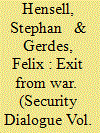

|
|
|
|
|
| Summary/Abstract |
The reintegration of rebels after war is a key security challenge. This article analyses the post-war transformation of rebels as a process of joining the established political elite. The political careers of former rebels vary. While some rise to senior political positions, others fail to consolidate their power. Taking theoretical notions of Pierre Bourdieu as its point of departure, this article outlines the central role of social capital in the post-war political field, which allows for an analysis and explanation of differences in rebel inclusion and exclusion. The article argues that the political careers of rebels are dependent on the accumulation of vertical and horizontal social capital in elite–mass and intra-elite networks. Case studies of Liberia and Kosovo demonstrate the plausibility of our thesis and the fruitfulness of a Bourdieusian approach in studying the political transformation of armed groups. This article contributes to the debate on the post-war reintegration of rebels as well as to the debate on practice approaches in international relations and security studies.
|
|
|
|
|
|
|
|
|
|
|
|
|
|
|
|
| 2 |
ID:
152404
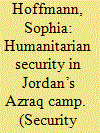

|
|
|
|
|
| Summary/Abstract |
Azraq, a new camp for Syrian refugees in the Jordanian desert, presents an unprecedented integration of humanitarian service delivery and harsh security measures. I argue that Azraq’s ‘innovative’ order can only be explained in reference to three security claims that international refugee aid answers to: the claim to secure Syrian refugees, the claim to secure the Jordanian state and the claim to secure aid workers. Implementing these claims entails contradictory practices, which should create dilemmas for humanitarian aid, yet in Azraq these practices merge with each other. This merging (or integration) is aided by the humanitarian sector’s eager embrace of hi-tech solutions, especially digital data management. The article contributes to the growing debate about how security is articulated in the humanitarian arena by placing this debate’s key findings into conversation within a richly researched study of Azraq’s ‘material assemblage’ (Hilhorst and Jansen, 2010; Meiches, 2015). Further, the article emphasizes the importance of the under-researched area of aid organizations’ own security management.
|
|
|
|
|
|
|
|
|
|
|
|
|
|
|
|
| 3 |
ID:
152407
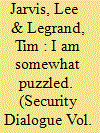

|
|
|
|
|
| Summary/Abstract |
A recent wave of scholarship has drawn attention to the need for further engagement with the role of ‘the audience’ in securitization ‘games’. This article contributes to this discussion both theoretically and empirically by exploring the types of question an audience may ask of a securitizing actor before a securitizing act meets with success or failure. To do this, it offers a discursive analysis of all 27 UK parliamentary debates on the extension of proscription powers to additional terrorist organizations between 2002 and 2014. We argue first that these debates are characterized by a wide range of questions relating to the timing, criteria, mechanics, consequences and exclusions of proscription; and second, that these questions function as demands upon the executive to variously justify, explain, clarify, elaborate and defend decisions to extend the UK’s list of designated groups. Taking these questions seriously, we suggest, therefore allows insight into a variety of ways in which audiences might participate in security politics that are not adequately captured by notions of consent or resistance, or success or failure. This has empirical and theoretical value for understanding proscription, parliamentary discourse and securitization alike.
|
|
|
|
|
|
|
|
|
|
|
|
|
|
|
|
| 4 |
ID:
153108
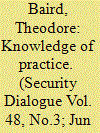

|
|
|
|
|
| Summary/Abstract |
This article takes the reader inside four border security fairs in Europe and North America to examine the knowledge practices of border security professionals. Building on the border security as practice research agenda, the analysis focuses on the production, circulation, and consumption of scarce forms of knowledge. To explore situated knowledge of border security practices, I develop an approach to multi-sited event ethnography to observe and interpret knowledge that may be hard to access at the security fairs. The analysis focuses on mechanisms for disseminating and distributing scarce forms of knowledge, technological materializations of situated knowledge, expressions of transversal knowledge of security problems, how masculinities structure knowledge in gendered ways, and how unease is expressed through imagined futures in order to anticipate emergent solutions to proposed security problems. The article concludes by reflecting on the contradictions at play at fairs and how to address such contradictions through alternative knowledges and practices.
|
|
|
|
|
|
|
|
|
|
|
|
|
|
|
|
| 5 |
ID:
153109


|
|
|
|
|
| Summary/Abstract |
This article investigates how war and occupation disrupt and produce new gender norms. It explores civilian masculinities and the ways in which masculinities are impacted by conflict and insecurity. Focusing on the West Bank, we argue that insecurity and occupation create the conditions for masculinity nostalgia, or a yearning for a set of gender norms and relations linked to fantasies of a secure, ‘traditional’ and ordered past. Masculinity nostalgia builds on conceptions of thwarted masculinity and the ways in which individuals are held accountable to gender norms. The article draws on interviews with Palestinians to highlight how masculinity nostalgia is associated with three particular identities: father, breadwinner and landowner. We demonstrate that Palestinian civilians lament the ways in which the occupation has impacted men’s ability to fulfil such archetypical identities, at the same time as they reaffirm the value and legitimacy of these identities. We argue that peace and security are often assumed to be dependent upon ‘the return’ of men to their presumed rightful places at the head of households and as economic providers. In turn, masculinity nostalgia emphasizes the ways in which yearnings for peace and security can be interwoven with yearnings for patriarchal gendered orders.
|
|
|
|
|
|
|
|
|
|
|
|
|
|
|
|
| 6 |
ID:
152405
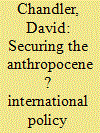

|
|
|
|
|
| Summary/Abstract |
This article analyses security discourses that are beginning to self-consciously take on board the shift towards the Anthropocene. It first sets out the developing episteme of the Anthropocene, highlighting the limits of instrumentalist cause-and-effect approaches to security, which are increasingly becoming displaced by discursive framings of securing as a process generated through new forms of mediation and agency and capable of grasping interrelations in a fluid context. This approach is the methodology of hacking: creatively composing and repurposing already existing forms of agency. It elaborates on hacking as a set of experimental practices and imaginaries of securing the Anthropocene, using as a case study the field of digital policy activism with a focus on community empowerment through social-technical assemblages being developed and applied in ‘the City of the Anthropocene’: Jakarta, Indonesia. The article concludes that policy interventions today cannot readily be grasped in modernist frameworks of ‘problem solving’ but should be seen more in terms of evolving and adaptive ‘life hacks’.
|
|
|
|
|
|
|
|
|
|
|
|
|
|
|
|
| 7 |
ID:
152406


|
|
|
|
|
| Summary/Abstract |
What were the effects of securities markets’ dynamics on the issue of political securitization, in the sense of the Copenhagen School, in the context of the sovereign debt crisis in the European Monetary Union (EMU)? This article addresses that question in an attempt to bring together the theory of political securitization and the financial securitization of government bonds. In conceptual terms, the article argues that the intervention of securities markets into the securitization of the euro can be understood as a confrontation between two types of validity claims. Securitizing moves, and the response they elicit, together constitute symbolically a political collectivity; this provokes a struggle between the adequate representation of that collectivity and its security concerns. In contrast to this, market communications – in fact, price signals – neither invoke a political collectivity nor can they be semantically refuted. Because of this quality, market signals can amplify or weaken securitizing moves. In the case of the EMU sovereign debt crisis, market communications triggered a privileging of supranational securitizations while impairing national ones.
|
|
|
|
|
|
|
|
|
|
|
|
|
|
|
|
| 8 |
ID:
153110
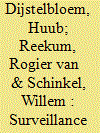

|
|
|
|
|
| Summary/Abstract |
The relationship between vision and action is a key element of both practices and conceptualizations of border surveillance in Europe. This article engages with what we call the ‘operative vision’ of surveillance at sea, specifically as performed by the border control apparatus in the Aegean. We analyse the political consequences of this operative vision by elaborating on three examples of fieldwork conducted in the Aegean and on the islands of Chios and Lesbos. One of the main aims is to bring the figure of the migrant back into the study of border technologies. By combining insights from science and technology studies with border, mobility and security studies, the article distinguishes between processes of intervention, mobilization and realization and emphasizes the role of migrants in their encounter with surveillance operations. Two claims are brought forward. First, engaging with recent scholarly work on the visual politics of border surveillance, we circumscribe an ongoing ‘transactional politics’. Second, the dynamic interplay between vision and action brings about a situation of ‘recalcitrance’, in which mobile objects and subjects of various kinds are drawn into securitized relations, for instance in encounters between coast guard boats and migrant boats at sea. Without reducing migrants to epiphenomena of those relations, this recalcitrance typifies the objects of surveillance as both relatable as well as resistant, particularly in the tensions between border control and search and rescue.
|
|
|
|
|
|
|
|
|
|
|
|
|
|
|
|
| 9 |
ID:
153111


|
|
|
|
|
| Summary/Abstract |
The last decade in Indonesia has seen the emergence of localized militia groups. In Bali, these groups are now particularly prolific. Conventional wisdom in international relations thought is that these organizations constitute a threat to the authority of the state (its monopoly on the legitimate use of force) and may require national security measures to deal with them. Yet these organizations ultimately define their own role in terms of the provision of security, claiming that they act to preserve or advance core values of their communities. In this sense, their security role with reference to the state is ambiguous: they often enjoy legitimacy at the local level and perform important security functions for their local communities, even while constituting an alternative site of security practice and challenging the (exclusive) security role of the Indonesian state. Drawing on ethnographic research, this article examines these actors as security agents and employs a framework of security contestation to make sense of the manner in which they engage with and redefine the provision of security in Bali. In this context, the emergence and practices of Balinese militia groups challenge the way we view non-state actors in the security space and, more generally, the way we conceive security agency in international relations.
|
|
|
|
|
|
|
|
|
|
|
|
|
|
|
|
|
|
|
|
|